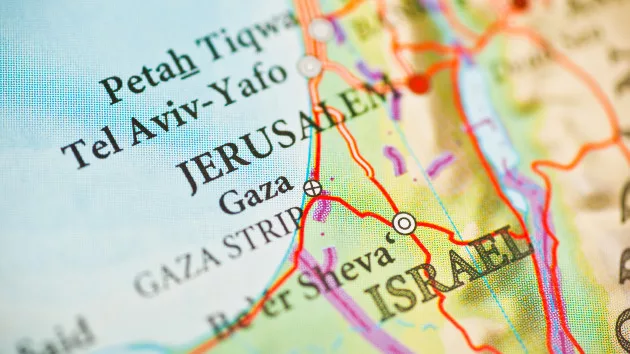(NEW YORK) — Palestinian teenage brothers Nasrallah, 17, and Qassam Al-Awar, 18, still can’t believe they’re home after being imprisoned by the Israeli government for 17 months.
“I didn’t know my name was on the list until 30 minutes before I was released,” Qassam Al-Awar told ABC News Tuesday. “I still couldn’t believe it until I arrived here and saw my house.”
The two brothers were released on Sunday as part of the recent humanitarian pause agreement struck between Israel and Hamas. So far, 210 Palestinian prisoners and detainees have been released. Meanwhile, Hamas has released 102 hostages, according to Israeli officials.
“We were thrilled to see our families and friends again, but we’re torn because of what’s happening in Gaza,” Nasrallah Al-Awar said.
The brothers expressed wariness about the ongoing Israeli practice of arresting and detaining Palestinian civilians, which has garnered renewed attention amid the hostage-prisoner exchange deal, with human rights groups underscoring what they say is a lack of due process.
The brothers said they had their first run-in with Israeli police at just 5 and 6 years old when they were detained for a few hours, and then released. They were again arrested in 2022 for what they say was an altercation with Israeli settlers in their East Jerusalem neighborhood of Silwan.
According to a list of 300 Palestinian prisoners eligible for release made public by the Israeli government, some of the offenses they were initially accused of include “supporting terrorism” and “negligently causing damage to property.” The brothers told ABC News they denied those allegations.
In civil court, Qassam Al-Awar was sentenced to 30 months in prison, and Nasrallah Al-Awar to 26 months.
And while offenses like “supporting terrorism” may sound more serious, rights groups say they’re often open to interpretation.
Human rights groups warn the Israeli judicial system lacks basic due process protections.
“A lot of the charges in the military justice system are vaguely defined and leave a lot of discretion, in particular to military officials who are the judges and prosecutors in these cases to interpret them as they wish, including vague charges like supporting terrorism, like endangering public security, like disrupting public order,” Sari Bashi, program director at Human Rights Watch in the West Bank, told ABC News.
“When you don’t have due process, then the authorities can try children for anything and everything,” she added.
According to Bashi, of the estimated 7,000 Palestinian prisoners and detainees being held by Israel, about 2,000 are people in pretrial detention, more than 2,000 were convicted of “security crimes,” and over 2,000 are being held without being charged in “administrative detention,” which is when someone is held under the presumption they might commit a criminal offense in the future.
The Israeli government has not responded to ABC News’ request for comment on detained Palestinians or its detention policies without due process.
And then there are the hundreds of Palestinians who are detained without ever being charged and without trial, according to the Palestinian Prisoners’ Club. The group also reports an uptick in the number of recent arrests: over 3,365 Palestinians have been arrested since the war broke out.
Among Palestinians released from Israeli prisons who ABC News spoke to, they described dire conditions, which they say worsened after the beginning of the war.
“From the first day, it was humiliating — beating us, threatening us with our house, that they will demolish our house. It got even worse after Oct. 7th,” Qassam Al-Awar said, referring to the day Hamas launched a surprise terror attack on Israel, precipitating the current war.
In the Gaza Strip, more than 15,000 people have been killed and over 36,000 have been wounded by Israeli forces since Oct. 7, according to the Hamas Government Media Office.
In Israel, at least 1,200 people have been killed and 6,900 others have been injured by Hamas and other Palestinian militants since Oct. 7, according to Israeli officials.
“We weren’t surprised; this is occupation. They don’t respect anyone, the young, the old,” Nasrallah Al-Awar said.
Despite being freed, the brothers said they fear for others in the ongoing war and if anything will change.
“We want to live in peace but the situation does not allow that,” Nasrallah Al-Awar said. “They demolish our houses, beat us up and crack down on us.”
“Even those who have not been imprisoned are afraid,” he said. “Some people are helpless. Like me, 24 hours before [the arrest] I would only go from my home to the school, and from school back home. From school to work, from work to school, from school to home. I would not go anywhere. Even if I went out, I’d visit friends at their home, not on the street.”
The two are now spending time at home, with friends and family stopping by to celebrate their return. Nasrallah Al-Awar said he’s most excited to go back to school, since he couldn’t study in jail and is about to graduate. However, he said his future remains uncertain.
“I’m afraid what happened to me will happen to others, or that they will arrest us again,” he said.
The brother did not comment on Hamas’ actions on Oct. 7.
Copyright © 2023, ABC Audio. All rights reserved.

